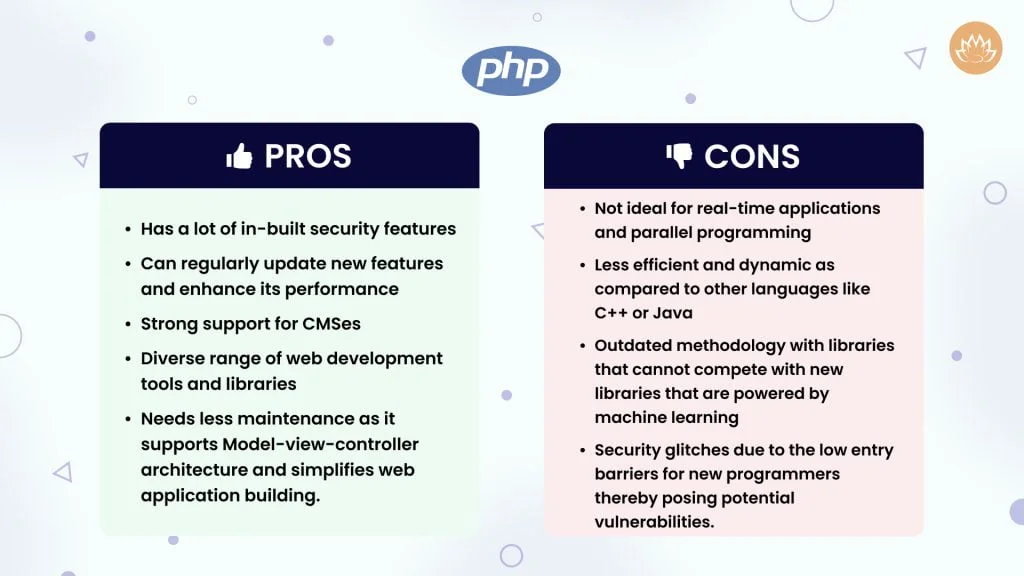What is Node.js?
- Provides full stack JavaScript both on the client-side and server-side making robust frontend and backend development
- Simple to learn and friendly to the new web programmers who want to learn quickly.
- Abundant tutorials and a vast user community support.
- Event-driven and allows programs to sleep while other requests are available
- Faster and scalable due to the non-blocking thread execution
- Vast ecosystem with numerous open source Node.js packages
Companies Using Node.js:

– Spotify
– Netflix
– Ebay
– Spotify
– Walmart
– Uber
– Trello
Pros and Cons of Node.js
Pros of Node.js
- Highly scalable due to non-blocking event-loop architecture
- Mostly suitable for parallel programming
- Can build real-time cross-platform apps without writing separate code.
- Flexible choice for front-end Javascript developers for building their back ends, keeping their productivity high with time optimization.
- In-built support for WebSockets to develop real-time applications
- Shorter time-to-market due to its light-weight and fast functionality
- Abundant Node.js libraries and ready-to-use programs with assets from GitHub
- Choicest backend model for building serverless functions and microservices

Cons of Node.js
- Poses a challenge for designing web apps that need sophisticated graphics rendering
- Lesser in-built security features
- Not much compatible with older or legacy systems
- Has an unstable API and needs to release new APIs regularly
- Cannot effectively support CMSes
What is PHP?
PHP is a Hypertext Preprocessor, that formerly worked for Personal Home Pages. It is an open-source, object-oriented, and server-side scripting language that primarily focuses on web development tools. It creates web servers and can be executed in the browser as well as through the command line. It uses Zend Engine which is a popular implementation for regular use.
PHP has endured through the testing times and has come out with a sustainable performance. It has a consistently increasing number of users due to its extraordinary characteristics. Some of these are:
- Supports major operating systems like Linux, macOS, and Windows.
- Highly compatible with primary web servers and cloud platforms like Microsoft Azure and AWS
- It is a server-side scripting language and creates a personalized interface for each user
- Comfortable with HTML and can interchanged with it
- Can easily connect with all databases like MongoDB, MySQL, PostgreSQL, and much more
- Compatible for most of the web technologies from cloud to HTML integration.
Companies using PHP

- Wikipedia
- WordPress
- Tumblr
- Slack
- Etsy
- Mailchimp
- DailyMotion
- Flickr
- Spotify
Pros and Cons of PHP?
Pros of PHP
- Has a lot of in-built security features
- Can regularly update new features and enhance its performance
- Strong support for CMSes
- Empowers web development frameworks, operating systems, web servers, and hosting platforms
- Diverse range of web development tools and libraries
- Needs less maintenance as it supports Model-view-controller architecture and simplifies web application building.

Cons of PHP
- Not ideal for real-time applications and parallel programming
- Less efficient and dynamic as compared to other languages like C++ or Java
- Outdated methodology with libraries that cannot compete with new libraries that are powered by machine learning
- Security glitches due to the low entry barriers for new programmers thereby posing potential vulnerabilities
Node.js Vs PHP - Detailed Comparison
So far you the insights about the basic usage of both the technologies and their features. Let us check them and compare them with other specific parameters. With this, you can further get a clear understanding to decide which application development is best suitable for your project.
Similarities
Language Interpretation
Interpreted language does not require an earlier compiling of a program into the machine language. The implementations get executed directly. Both the backend technologies first allow development on the specific implementation page with no interruptions in the process. It reduces program size, sets dynamic typing, and performs debugging seamlessly.
Cross-platform Compatibility
The population is becoming more tech-savvy and digitalized. Business owners choose a flexible cross-platform tech stack that can fulfill the needs of their target audience. Both PHP and Node.js are cross-platform independent technologies that operate on Linux, Windows, and macOS. Node.js contains several Docker images for the Docker Hub. PHP runs directly through the command line.
Application Type
Both Node.js and PHP run on a server and can manage the routed requests. You can overlap them for performing static content, dynamic web pages, and data requests. Node web sockets are a bit conventional and PHP introduces web socket servers. PHP uses Ratchet and Node.js socket.io. Both the models serve streams where Node has Stream API and PHP has custom codes.
Services
Both can serve web requests and are efficient in serving web sockets. They can easily manage diverse web content and can provide interactive user-friendly interfaces.
Extensibility
Both backend technologies are open-source and are rich with a dynamic ecosystem of add-ons and possibilities of boundary expansions. You can also alter the code according to the need and make it according to the project requirement.
In-depth Comparison Between Node.js and PHP
Popularity
Around 80% of websites are built with PHP while Node.js is used only for 1-2% of websites. On the contrary, from the viewpoint of the rising number of users, Node.js is growing with great consistency. However, PHP still has a grip over the major chunk of the market.

Looking in terms of gaining popularity, Node.js is the most popular framework among developers. 47.12% of developers prefer Node.js for building projects. The in-depth categorization talks about 46.31% of core professionals using Node.js and 52.86% of learning developers prefer it for building web applications. To summarize, both tech stacks are gaining equal importance in the market and are rising quickly.
Performance
Node.js is asynchronous and uses JavaScript V8 Engine. It provides quick start-up time and has outstanding speed. Node.js is event-driven and avoids blocking requests by executing them concurrently. When the concurrency of Node.js and JavaScript is combined, it delivers the most suitable environment for high-performance application development.
PHP is quite known to the market and has a unique way of handling requests. It is comparatively slower and its synchronous code execution procedure blocks the process if the executions are not completed. This leads to extended loading time with no concurrency. When it gets linked with HHVM, PHP performance gets a great boost.
Learning Curve
Node.js is the best choice for those who are well acquainted with JavaScript. Developers who are new to JavaScript may find Node.js complicated initially. In that case, they must first learn JavaScript. Hence, Node.js has a steeper learning curve.
PHP language is simple to learn and needs developers who know CSS and HTML. The learning curve becomes steeper when they have to deal with multiple technologies at the same time.
Development Kit
PHP contains a package manager that has Composer – helping to manage modules and dependencies. The basic difference here is that NPM is built while Composer needs to be built on your own.
Concurrency
When you build a basic project, speed is very important for processing and execution. The majority of technologies are good in speed except when it comes to performing costly functions that need special algorithms and compilers or languages.
With Node.js you get a high-speed execution rate due to its lightweight, event-driven, efficient, and non-blocking I/O model. It relies on three programming ‘wizards’ called: Async, Concurrency, and Parallelism programming.

The asynchronous design style helps Node.js perform several functions together while running an application. The event systems of Node.js enable it to function more feasible and faster and the server responds to the previous API request.

While in PHP, there is a slower asynchronous code implementation. Hence each module function is executed as per the indicated order in the code. A query that fails to perform will hamper the entire process to run further until a concurrent query gets resolved. However, PHP is consistent in terms of delivering better performance and executing accurate programs irrespective of the speed. Paired with the HHVM Virtual Machine, it gets enhanced performance.
Syntax
PHP syntax enables backward compatibility ensuring smooth movement of your code from the older versions to the new versions. But while doing this, several other functions may get hampered as it allows the single most function to perform in multiple ways.
With Javascript, there are numerous tendencies involved that can attract developers including lightweight Syntax. Although it has faced several criticisms, math libraries can easily solve such problems. The topmost benefit of Node.js remains here as Syntax is very simple to learn and you need not learn a completely different language. The only thing is you must be familiar with JavaScript language.
Database
Node.js performs with MongoDB, Couch DB, and other NoSQL databases. It also functions with graph databases like Neo4j. Node.js can interact with SQL databases although developers’ first choice remains the NoSQL database. This is because the built-in JSON support allows Node.js to work better with NoSQL databases.
PHP is used in RDBMS or relational database management systems like MySQL, PostgreSQL, and MS SQL. MySQL is used in the majority of PHP websites although it is a part of the renowned open-source stack LAMP. Hence, Node.js is the best option if you want to scale your application.
Security
We all know that no programming language has a permanent security solution to avoid hacking and cyberattacks. However, building a robust system that makes the application immune to the majority of security attacks is worthwhile.
Node.js encounters vulnerabilities like machine-in-the-middle attacks, code injection, and advanced persistent threats. It faces security issues like XSS attacks, Cross-site request forgery, data leaks, and HTTP reading header issues.

Node.js also offers a solution. It performs various security practices with authentication tools like Firebase, OWASP Dependency Check, and Acutinex for handling problems with ease, reducing vulnerability, and creating a secure system.
To ensure safety and security issues for PHP, think via a secured design. For that, you can encrypt and decrypt a string in PHP while using the OpenSSL function extension called Cryptography. Also, you can implement LBS (Language based security) to strengthen the security of your apps.
Modules and Extensibility
Modules are program components serving multiple functions related to each other. Together they can build a specific program. With modules, you can extend the technology capabilities.
In Node.js, these modules are isolated units of code interfacing with external applications as per their single capacity. Either the modules are single files or they are in groups with a lot of folders or files. Modules can be reused and can be broken down into digestible bits if become problematic.

PHP has three types of modules namely bundled extensions, core extensions, and entirely external extensions. Bundled extensions are defaulted with the PHP installation. The entirely external extensions do not come with core PHP or a specific package. Most PHP extension modules are written in C programming language. With PHP, you can compile them to become either static loading or dynamic loading.
With PHP you get a vibrant collection of extension modules providing a great deal of extensibility.
Scalability
Node.js performs better in terms of achieving scalability as compared to PHP. PHP is easy to learn but is very difficult to master. And that is why developers find it difficult to build complex PHP applications. Node.js is comparatively user-friendly and needs a clear understanding of JavaScript.
Hosting
Both are popular and prominent global hosting providers and are equally reliable. Mostly, hosting prices are decided based on the availability of these hosting companies. So before you pick up any one of the hosting plans out of the two above, make sure you prioritize speed performance and the ability to maintain tighter security.
Ecosystem
Open source platform community always enriches the entire ecosystem. Made of users and enthusiasts who love exploring popular technologies provides numerous libraries, premade projects, frameworks, resources, and support to fresh learners.
Node.js has an active online community that has provided a pool of online materials and has answered several queries from developers. Some popular groups are Google Groups, GitHub, and IRC.

Node.js Vs PHP - Side-by-Side Comparison Table

Which one Should You Choose?
Both the backend technologies offer a diverse range of options for developing web applications. The below use cases will benefit you in deciding which would be your ideal choice:
Node.js Use Cases :

- Real-time web applications for online gaming apps, social media apps, chat apps, etc.
- Single Page Applications when you want easy data transfer between the client side and server side of the application
- Microservices for fast development with effective results
- Big Data and Analytics Solutions to cope up with the problems in dealing with the enormous data
- Web Extraction and Automation Solutions to obtain information and extract data from automated websites with unique packages like request and cheerio.
PHP Use Cases :
- Server Side Scripting to generate dynamic web pages by performing tasks like accessing databases, sending emails, and processing form data
- eCommerce Portals like Magento and WooCommerce provide features like inventory management, order tracking, and payment processing
- Content Management systems like WordPress, Drupal, and Joomla can be built with PHP for creating and managing digital content like blogs, web pages, and multimedia.
- Social Media Platforms to manage massive amount of data processing, user interaction, and content management.
- Enterprise Applications to handle complex business logic, user roles and permissions.

Conclusion
FAQs
How Node.js is better than PHP?
Node.js allows the execution of JavaScript code on the server side. It replaces PHP in terms of presenting better performance. However, PHP is better under certain conditions.
Node.js vs PHP which is the best in 2023?
Choose Node.js for apps that need frequent updates and have collaborative tools and documentation suites. Use PHP for complex projects and consider it an ideal choice for startups in 2023.
Node.js or PHP which should be chosen for Microservice Architecture?
Node.js is a lightweight scripting tool and has an event-driven architecture. It makes the development process fast and easy to maintain. So it is preferred over PHP.
Which one is more secure Node.js or PHP?
Node.js is secured but is vulnerable as it uses third-party packages. However, more vulnerabilities are linked with PHP according to National Vulnerability Database. Both are not completely secure, however, Node.js is more secure than PHP.
Author

Sunil is a result-orientated Chief Technology Officer with over a decade of deep technical experience delivering solutions to startups, entrepreneurs, and enterprises across the globe. Have led large-scale projects in mobile and web applications using technologies such as React Native, Flutter, Laravel, MEAN and MERN stack development.
View all posts









